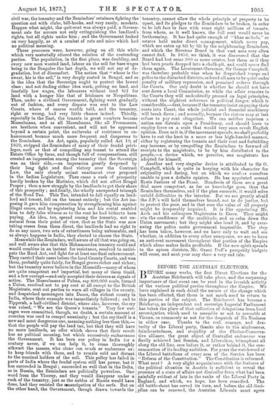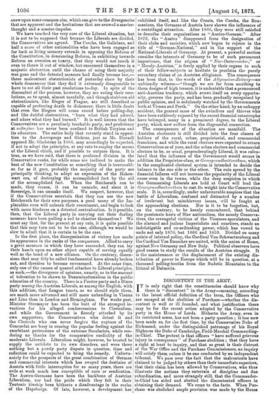BEFORE THE AUSTRIAN ELECTIONS.
BEFORE many weeks, the first Direct Elections for the Austrian Reichsrath will take place, and the surpassing
importance of that event can be read in the feverish activity of the various political parties throughout the Empire. We have explained in such detail the nature of the change which has been effected, that there is not much need to return to this portion of the subject. The Reichsrath has become a Reichstag, an independent and sovereign Imperial Parliament has taken the place of that collection of delegations from local sovereignties, which used to assemble or not to assemble at Vienna, as commonly as not for the despatch of No Business in either case. Thanks to the zeal, courage, and dex- terity of the Liberal party, thanks also to the aimlessness, faintheartedness, and stupidity of the Clerico-Conserva- tive alliance, the great object of Centralist endeavour was finally achieved last Session, and Liberalism, triumphant all along the old line, sees before it, or rather behind it, the con- summation of its leading ambition. For years the watchword of the Liberal battalions of every arm of the Service has been "Reform of the Constitution." The Constitution is reformed. What next ? A very slight acquaintance with the features of the political situation in Austria is sufficient to reveal the presence of a state of affairs not dissimilar from what had been painfully evident of late in the ranks of the Liberal Party in England, and which, we hope, has been remedied. The old battle-shout has served its turn, and before the old disci- pline can be renewed, the Austrian Liberals must agree anew upon some common aim, which can give to the divergencies that are apparent and the hesitations that are avowed a master- thought and a master-impulse.
We have touched the very core of the Liberal situation, but it is not to be supposed that because the Liberals are divided, the Conservatives are agreed. The Czechs, the GaHelens, and half a score of other nationalities who have been engaged as far back as living memory extends in opposing the Reform of the Constitution, in denouncing Reform, in exhibiting towards Reform an aversion so hearty, that they would not touch it even to throw it out of window, but ensconced themselves in a majestic abstention until the chance of using their majority was gone and the detested measure had finally become law,— these malcontent abstentionists of yesterday show by their whole demeanour that they find it extremely disagreeable to have to eat all their past resolutions to-day. In spite of the discomfort of the process, however, they are eating their reso- lutions, so to speak, almost manfully, and though stubborn old abstentionists, like Rieger of Prague, are still described as capable of preferring death to dishonour, there is little doubt that even the Riegers will come round before polling-day, and like dutiful obstructives, "burn what they had adored, and adore what they had burned." It is well known that the Conservatives are a peculiarly teachable party, and proficiency at volts-face has never been confined to British Toryism and its educators. The entire body that recently stood in opposi- tion to the Auerspergs and Giskras, just as Mr. Disraeli opposed Mr. Gladstone in 1866, may accordingly be expected, if not to adopt the principles, at any rate to employ the means of the Liberal chiefs, and if possible to outpass them. It is trine, as we have said, that there is profound division in the Conservative ranks, for while some are inclined to make the best of the new Constitution as something that is irrevocable so far as it goes, probably the majority of the party are principally thinking, to adopt an expression of the Hohen- wart era, of destroying the accomplished fact by the aid of the accomplished fact. When the ]leicharath can be made, they reason, it can be unmade, and since it is Sovereign, it can unmake itself. We suspect, however, that if the Conservatives ascertain that they can use the new Reichsrath for their own purposes, a good many of the Im- placables even will unlearn their resentment, and begin to look with more kindness on a detested centralisation. Is it possible, then, that the Liberal party in carrying out their darling measure have been pulling a rod to chastise themselves ? We must say that, for the present at any rate, it is quite possible that this may turn out to be the case, although we would be slow to admit that it is certain to be the case.
In the first place, the disorganisation of victory has made its appearance in the ranks of the conquerors. Allied to carry a great measure in which they have succeeded, they can lay their hands upon no other object capable of serving equally well as the bond of a new alliance. On the contrary, dissen- sions that may fitly be called fundamental have already broken out, and threaten to become envenomed. At the same time, only one of the causes of quarrel attaches to Liberal principles, as such,—the divergence of opinions, namely, as to the amount of toleration to be shown to Denominationalism in the public education of the country. There is a Forster party and a Dixon party among the Austrian Liberals, as among the English, with this addition, that League tenets, as we should style them, are much more advanced and still more unbending in Vienna and Linz than in London and Birmingham. For weeks past, Minister Stremayer has been the butt of the strongest in- vectives for his alleged condescensions to Clericalism, and while the Government is fiercely attacked by its own supporters, the Conservatives who detest it and the Clericals who can never forgive the rupture of the Concordat are busy in rousing the popular feeling against the exorbitant pretensions of the extreme Secularists, while ren- dering no thanks for the comparative cordiality of the moderate Liberals. Liberalism might, however, be trusted to supply the antidote to its own disorders, and were there nothing but a purely party dispute in question, time and reflection could be expected to bring the remedy. Unfortu- nately for the prospects of the great combination of German and commercial interests which has swayed the destinies of Austria with little interruption for so many years, there are evils at work much less susceptible of cure or eradication. The Austro-Germans have been the backbone of Austrian Liberalism, nor had the pride which they felt in their Teutonic kinship been hitherto a disadvantage in the realm of the Hapsburgs. Of late, however, a development has exhibited itself, and like the Croats, the Czechs, the Rou- manians, the Germans of Austria have shown the influences of a centrifugal attraction. After 1866, they were still satisfied to describe their organisations as " Austro-German." After 1870, the " Austro " disappeared from the designation of their clubs and societies, which now began to rejoice in the title of "German-National," and in the support of the National-Liberals of Germany. At present, a powerful section consider the interests of Germany to be of such paramount importance, that the stigma of " Nur-Oesterreicher," or "Merely-Austrian," is freely applied by their organs to such of their fellow-subjects as hesitate to proclaim the purely secondary claims of an Austrian allegiance. The consequence has been that, in the words of the Allgemeine-Zeitung—no unfriendly witness—" though we are far from ascribing to them designs of high treason, it is undeniable that a pronounced anti-Austrian tendency, which avows itself on every opportu- nity, governs the party, and has been gradually recognised by public opinion, and is sedulously watched by the Governments both at Vienna and Pesth." On the other hand, by an unhappy accident, the general mass of the swindlers and thieves who have been ruthlessly exposed by the recent financial catastrophe have belonged, many in a prominent degree, to the Liberal party, which now suffers from the disgraceful connection.
The consequences of the situation are manifold. The Austrian electorate is still divided into the four classes of holders of the rural, urban, proprietorial, and commercial franchises, and while the rural electors were expected to return Conservatives as of yore, and the urban electors and commercial electors to be, as usual, preponderatingly Liberal, it was calcu- lated that the influence of the Government would secure in addition the Proprietor-class, or Grossgranclbesitzerthum, which in the complicated electoral system is intended to decide the balance to the one side or the other. The ruin spread by the financial failures will not increase the popularity of the Liberal cause even in the towns, while the deep suspicion in which the Germanising Liberals are held at Court will lead the Grossgrundbesitzerthens to cast its weight into the Conservative scale. It is, accordingly, under unfavourable auspices that the battle of Liberalism, confused and distracted by a number of irrelevant but mischievous issues, will be fought at the approaching elections. Nor is it to be forgotten, but, on the contrary, to be keenly remembered, that behind the passionate hosts of Slav nationalism, the moody Conserva- tives, the revengeful victims of the Viennese speculators, and the alarmed and jealous Imperialists and courtiers, stands an indefatigable and co-ordinating power, which has vowed to undo not only 1870, but 1866 and 1859. Divided on many points of internal policy, the Cardinal Von Schwartzenburg and the Cardinal Von Rauscher are united, with the union of Rome, against New Germany and New Italy. Political observers have good reason to study the results of the Austrian struggle. It is the maintenance or the displacement of the existing dis- tribution of power in Europe which will be in question, at a thousand polling-booths from the Sudetic Mountains to the littoral of Dalmatia.































 Previous page
Previous page